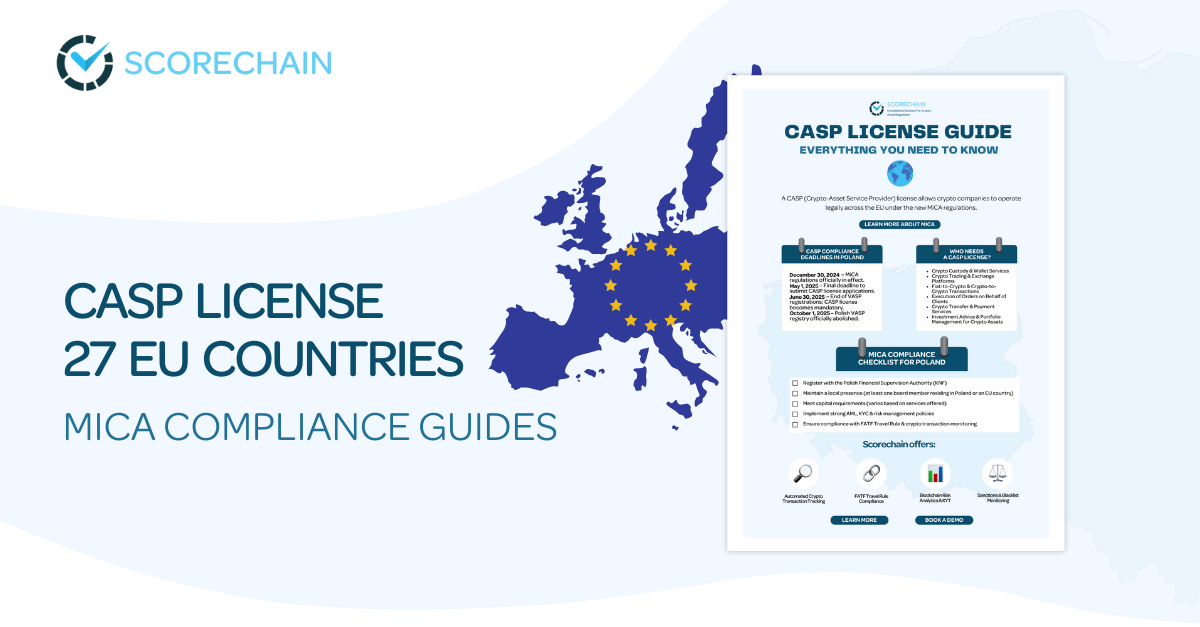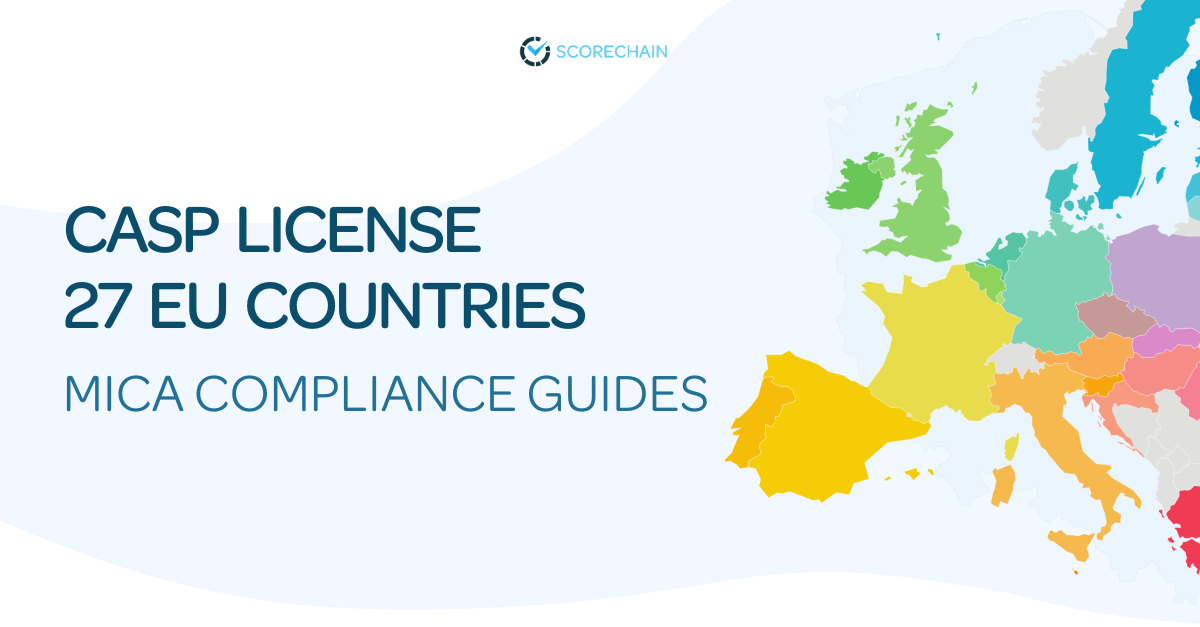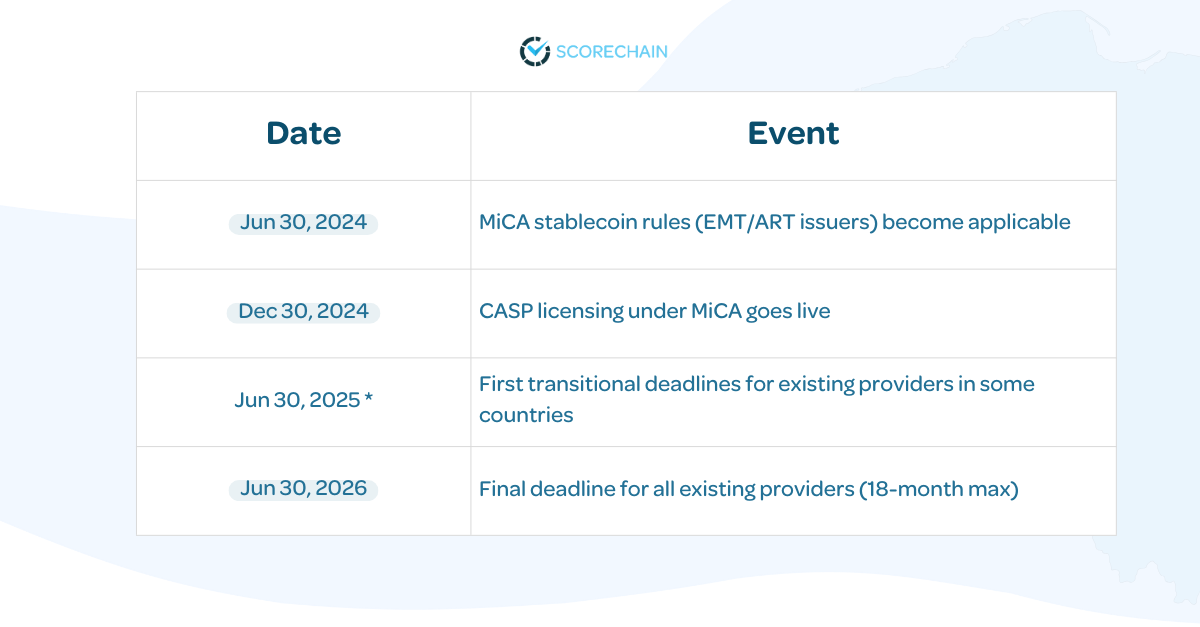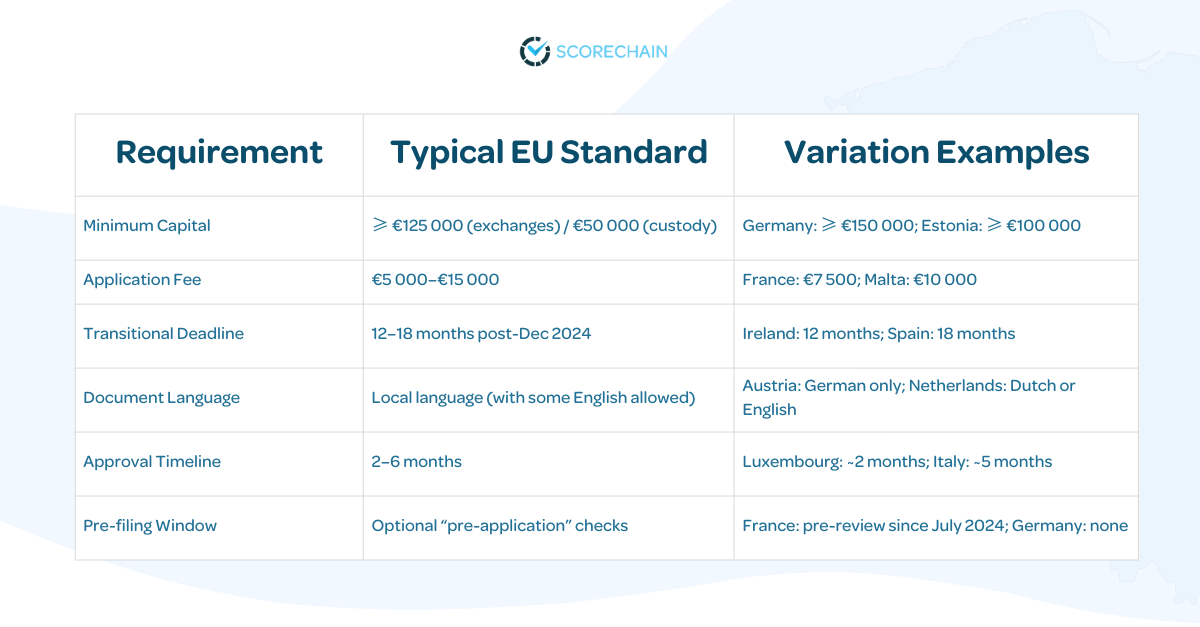350+ COMPLIANCE & DIGITAL ASSET TEAMS TRUST US






















Quick 2-page guides for every EU/EEA country - compare, learn more and get licensed under MiCA
350+ COMPLIANCE & DIGITAL ASSET TEAMS TRUST US























In this guide, we break down:
- What is MiCA.
- How to get a Crypto-Asset Service Provider (CASP) license.
- Key deadlines and compliance requirements across all countries.
- The unique aspects of each EU/EEA country’s approach to MiCA.
We’ve also created guides for every EU country, so you can explore your options and choose the jurisdiction that best fits your business.
Here’s the full list of EU and EEA countries. Click your country to read its dedicated guide:
🇦🇹 Austria
🇧🇬 Bulgaria
🇭🇷 Croatia
🇨🇾 Cyprus
🇨🇿 Czech Republic
🇩🇰 Denmark
🇪🇪 Estonia
🇫🇮 Finland
🇫🇷 France
🇩🇪 Germany
🇬🇷 Greece
🇭🇺 Hungary
🇮🇪 Ireland
🇮🇹 Italy
🇱🇻 Latvia
🇱🇹 Lithuania
🇱🇺 Luxembourg
🇲🇹 Malta
🇳🇱 Netherlands
🇵🇱 Poland
🇵🇹 Portugal
🇷🇴 Romania
🇸🇰 Slovakia
🇸🇮 Slovenia
🇪🇸 Spain
🇸🇪 Sweden

The Markets in Crypto-Assets Regulation (MiCA) is the European Union’s first attempt to harmonize crypto regulation across all 30 EEA countries.
Before MiCA, each country had its own rules (or no rules at all). Now, MiCA creates a single framework that:
From 30 December 2024, crypto companies offering services in the EU must comply with MiCA or risk losing access to the European market.
A MiCA license allows you to:
Operate legally in one EU country.
“Passport” your services across all other EEA states without separate licenses.
But each country still manages its own application process through their national regulators. That means there are important local nuances to consider before choosing where to apply.

*Check your country guide for the exact transitional cutoff—some NCAs chose 12 months; others up to 18.
Tip: New crypto businesses must apply and get approval before launching services. Existing providers may benefit from transitional arrangements (but deadlines vary by country).
To become a Crypto-Asset Service Provider under MiCA, you need to:
The regulator will assess your:
Once approved, you can operate across the EU.
While details vary, every CASP license under MiCA demands the following core building blocks:

At Scorechain, we help crypto companies prepare for MiCA compliance. From wallet screening to AML risk monitoring, our tools make it easier to meet EU regulatory standards.
Automated, real-time monitoring.
No need to manually compile audit trails or generate compliance exports.
MiCA expects CASPs to comply with the FATF Travel Rule for fund transfers.
Scorechain lets you tailor your compliance logic.
MiCA applies across all your digital assets—Scorechain covers them.
For MiCA-licensed entities, audits are inevitable. Make them painless.

Live Case:
A mid-sized CASP integrated Scorechain to automate KYC flows, wallet screening, risk flags, and Travel-Rule enforcement, resulting in a successful mock ESMA review in hours.
Built in Europe, for Europe
We speak your regulatory language - whether you're dealing with BaFin, AMF, CNMV, or CSSF.
Human Support That Knows Your Business
Every Scorechain client gets direct access to expert compliance support - not just chatbots or email forms. Need help prepping your whitepaper annex? Want feedback on your AML policy before filing? We’ve got you covered.
Scalable Infrastructure
From startups to top-tier banks, Scorechain scales with your needs. Handle millions of transactions, screen hundreds of wallets, or monitor token usage globally -with no performance bottlenecks.
Plug-and-Play Integrations
Easy APIs and Webhooks make Scorechain fit into your stack, whether you're using third-party KYC vendors, internal case management, or regulatory portals.

Q: When did MiCA become law?
MiCA entered into force on 29 June 2023, with two key compliance deadlines: 30 June 2024 (stablecoins) and 30 December 2024 (CASPs and others).
Q: What documents must be submitted to regulators?
To apply for MiCA authorization as a Crypto Asset Service Provider (CASP) or token issuer, you'll need to provide:
Requirements may vary slightly between EU member states. Scorechain tracks and aligns with jurisdiction-specific demands.
Q: Who is affected by the MiCA Regulation?
MiCA applies to:
In short: if you deal with crypto in the EU, you’re likely in scope.
Q: Who do you apply to for authorization?
Authorization requests must be submitted to your local National Competent Authority (NCA) - the financial supervisor in your country.
Examples include:
Q: Are non-EU firms included?
Yes - if you service EU clients or maintain EU wallets, MiCA applies. Passport rights enable cross-border services.
Q: What are penalties for non-compliance?
Fines vary by country, but can reach millions or lead to license suspension. Reputational fallout is a major risk .
Q: Do DeFi and NFTs count?
While covered generically, DeFi and NFTs introduce grey areas. National approaches vary - so assess local guidance.
Ready to take MiCA compliance off your worry list?
Book a call with Scorechain and learn how we help crypto companies reduce the cost, risk, and complexity of meeting MiCA requirements.